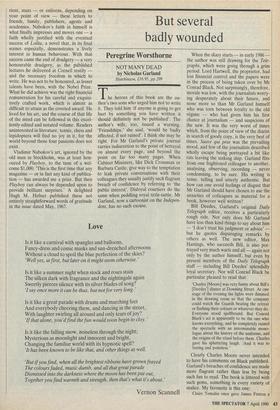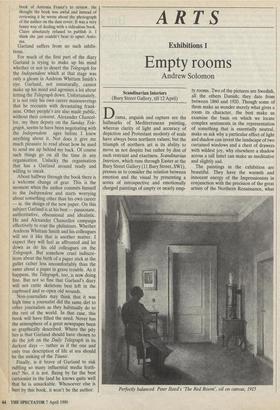But several
badly wounded
Peregrine Worsthorne
NOT MANY DEAD by Nicholas Garland Hutchinson, £16.93, pp.299 The heroes of this book are the au- thor's two sons who urged him not to write it. They told him 'if anyone is going to get hurt by something you have written it should definitely not be published'. The author's wife, too, issued a warning. `Friendships,' she said, 'would be badly affected, if not ruined'. I think she may be right. For Mr Garland's private journal carries indiscretion to the point of betrayal on almost every page, and beyond the point on far too many pages. When Cabinet Ministers, like Dick Crossman or Barbara Castle, give way to the temptation to leak private conversations with their colleagues they usually justify such flagrant breach of confidence by referring to 'the public interest'. Disloyal courtiers do the same when peddling royal tittle-tattle. Mr Garland, now a cartoonist on the Indepen- dent, has no such excuse. When the diary starts — in early 1986 the author was still drawing for the Tele- graphs, which were going through a grim period. Lord Hartwell, the proprietor, had lost financial control and the papers were in the process of being taken over by Mr Conrad Black. Not surprisingly, therefore, morale was low, with the journalists worry- ing desperately about their future, and none more so than Mr Garland himself who was torn between loyalty to the old regime — who had given him his first chance at journalism — and suspicions of the new. It was the very worst of times which, from the point of view of the diarist in search of goody copy, is the very best of times. Sauve qui peut was the prevailing mood, and few of the journalists described wholly escape being portrayed a bit like rats leaving the sinking ship. Garland flits from one frightened colleague to another, analysing, observing, recording — never condemning, to be sure. His writing is tense, telling and utterly authentic. But how can one avoid feelings of disgust that Mr Garland should have chosen to use the anxieties of colleagues as material for a book, however well written?
Bill Deedes, Garland's original Daily Telegraph editor, receives a particularly rough ride. Not only does Mr Garland have less than kind things to say about him — 'I don't trust his judgment or advice' but he quotes disparaging remarks by others as well. The new editor, Max Hastings, who succeeds Bill, is also por- trayed very much warts and all — again not only by the author himself, but even by present members of the Daily Telegraph staff — including Bill Deedes' splendidly loyal secretary. Nor will Conrad Black be particular pleased to read that: `Charles [Moore] was very funny about Bill's [Deedesi dinner at Downing Street. At one stage of the evening the lights were dimmed in the drawing room so that the company could watch the Guards beating the retreat or flashing their colours or whatever they do. Everyone stood spellbound. But Conrad Black's act is apparently to be the one who knows everything, and he completely ruined the spectacle with an interminable mono- logue about the history of the uniforms, and the origins of the ritual before them. Charles gave his spluttering laugh. 'And it was so boring and pointless.'
Clearly Charles Moore never intended to have his comments on Black published. Garland's breaches of confidence are made more flagrant rather than less by being such fun to read. The book is littered with such gems, something in every variety of malice. My favourite is this one:
Claire Tomalin once gave James Fenton a book of Antonia Fraser's to review. He thought the book was awful and instead of reviewing it he wrote about the photograph of the author on the dust cover. It was a very funny way of dealing with a ridiculous book. Claire absolutely refused to publish it. I think she just couldn't bear to upset Anto- nia.
Garland suffers from no such inhibi- tions.
For much of the first part of the diary Garland is trying to make up his mind whether or not to desert the Telegraph for the Independent which at that stage was only a gleam in Andreas Whittam Smith's eye. Garland, not unnaturally, cannot make up his mind and agonises a lot about letting the Telegraph down. Unfortunately, it is not only his own career manoeuvrings that he recounts with devastating frank- ness. Other people's are also made public, without their consent. Alexander Chancel- lor, my then deputy on the Sunday Tele- graph, seems to have been negotiating with the Independent ages before I knew anything about it. Nor does it give me much pleasure to read about how he used to send me up behind my back. Of course such things go on all the time in any organisation. Unlucky the organisation that has a Garland around ready and willing to sneak.
About halfway through the book there is a welcome change of gear. This is the moment when the author commits himself to the Independent and starts worrying about something other than his own career — ie. the design of the new paper. On this subject Garland is at his best — passionate, authoritative, obsessional and idealistic. He and Alexander Chancellor campaign effectively to rout the philistines. Whether Andreas Whittam Smith and his colleagues will see it like that is another matter. I expect they will feel as affronted and let down as do his old colleagues on the Telegraph. But somehow cruel indiscre- tions about the birth of a paper stick in the gullet rather less uncomfortably than the same about a paper in grave trouble. As it happens, the Telegraph, too, is now doing fine. But not so fine that Garland's diary will not rattle skeletons best left in the cupboard and re-open old wounds.
Non-journalists may think that it was high time a journalist did the same dirt to other journalists as they habitually do to the rest of the world. In that case, this book will have filled the need. Never has the atmosphere of a great newspaper been so graphically described. Where the pity lies is that Garland should have chosen to do the job on the Daily Telegraph in its darkest days — rather as if the one and only true description of life at sea should be the sinking of the Titanic.
Finally, is it brave of Garland to risk ruffling so many influential media feath- ers? No, it is not. Being by far the best cartoonist in the land he knows quite well that he is unsackable. Whosoever else is hurt by this book, it won't be the author.



























































 Previous page
Previous page